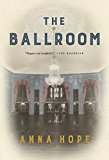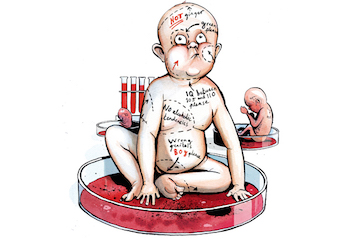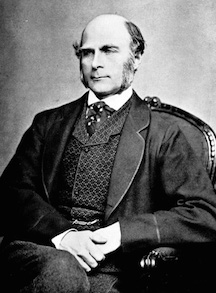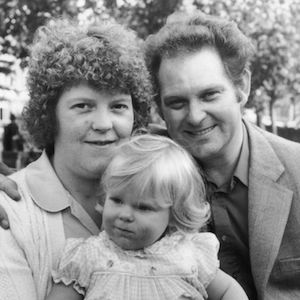Summary | Excerpt | Reviews | Beyond the Book | Read-Alikes | Genres & Themes | Author Bio

 Book Reviewed by:
Book Reviewed by:
Claire McAlpine
Buy This Book
This article relates to The Ballroom
 As mentioned in Anna Hope's historical novel The Ballroom, just over 100 years ago in 1912, London hosted the first International Eugenics Conference, an event attended by people who believed in the prevention of those deemed inferior – whom they labeled 'feeble-minded' – from reproducing. It was a categorization that referred more to their social class and wealth than intellectual ability. From The Spectator, 25 May 1912:
As mentioned in Anna Hope's historical novel The Ballroom, just over 100 years ago in 1912, London hosted the first International Eugenics Conference, an event attended by people who believed in the prevention of those deemed inferior – whom they labeled 'feeble-minded' – from reproducing. It was a categorization that referred more to their social class and wealth than intellectual ability. From The Spectator, 25 May 1912:
The only way of cutting off the constant stream of idiots and imbeciles and feeble-minded persons who help to fill our prisons and workhouses, reformatories, and asylums is to prevent those who are known to be mentally defective from producing offspring. Undoubtedly the best way of doing this is to place these defectives under control. Even if this were a hardship to the individual it would be necessary for the sake of protecting the race.
 Eugenics comes from the Greek eugenes meaning well born (specifically, eu meaning good, well and genos meaning 'race, stock, kin'.) Though the principles of the movement were found as far back in time as the Ancient Greeks, the UK founder of the movement and cousin of Charles Darwin, Francis Galton, coined the term in 1883.
Eugenics comes from the Greek eugenes meaning well born (specifically, eu meaning good, well and genos meaning 'race, stock, kin'.) Though the principles of the movement were found as far back in time as the Ancient Greeks, the UK founder of the movement and cousin of Charles Darwin, Francis Galton, coined the term in 1883.
His hypothesis was that because so many great men came from the same families, genius must be hereditary. He wondered if developments in medical science that had enabled the survival of those who would have perished were diluting the strength of the nation's genes.
In The Ballroom, Dr Fuller prepares a paper for the Eugenics Conference and writes a letter to Winston Churchill, the Home Secretary, from whom he receives a favorable reply. In reality, it was Churchill who wrote to the Prime Minister, urging him to do more to prevent the "multiplication of the unfit." Many highly prominent leftist intellectuals also held strong views in favor of eugenics, including staunch feminist and founder of the first birth control clinic in London, Marie Stopes, who disinherited her own son for marrying a woman with short-sightedness, risking, in her view, the birth of a less than perfect grandchild.
A Sterilization Bill was presented to the British parliament in 1931, which had the support of social workers, local authorities and the medical and scientific establishment. It had become an accepted idea in educated circles in the developing world, though later it would be connected to the Nazis and treated as if it had been something only they could have dreamed and carried out.
Eugenics may seem to have all but disappeared after the horrors of World War II, but recent medical advances blur the line between saving lives and questing for human perfection.
 The first baby born using IVF was Louise Brown, conceived in a laboratory 38 years ago, and today embryos can be fertilized and then screened for diseases. A year ago, Chinese scientists succeeded in modifying the genes of a fertilized embryo, while in the US, 150 scientists and academics called for a complete shutdown on human gene editing, stating in a letter released before a summit in Washington D.C.: "We must not engineer the genes we pass on to our descendants." But it is not that simple. Meanwhile, a government funded British institute was given the go-ahead to begin a new, controversial genetic editing technique. And in April 2016, a baby was born with the DNA from three people to prevent the genes for a rare and deadly decease carried in the mother's mitochondria being passed to the child. Mitochondria exist in every cell in the body except red blood cells and are responsible for providing the body with most of its energy. Swapping out the mother's defective mitochondria for healthy mitochondria is akin to changing the battery in a flashlight. The battery has changed but the flashlight itself is just the same, except that it now has the energy to turn on.
The first baby born using IVF was Louise Brown, conceived in a laboratory 38 years ago, and today embryos can be fertilized and then screened for diseases. A year ago, Chinese scientists succeeded in modifying the genes of a fertilized embryo, while in the US, 150 scientists and academics called for a complete shutdown on human gene editing, stating in a letter released before a summit in Washington D.C.: "We must not engineer the genes we pass on to our descendants." But it is not that simple. Meanwhile, a government funded British institute was given the go-ahead to begin a new, controversial genetic editing technique. And in April 2016, a baby was born with the DNA from three people to prevent the genes for a rare and deadly decease carried in the mother's mitochondria being passed to the child. Mitochondria exist in every cell in the body except red blood cells and are responsible for providing the body with most of its energy. Swapping out the mother's defective mitochondria for healthy mitochondria is akin to changing the battery in a flashlight. The battery has changed but the flashlight itself is just the same, except that it now has the energy to turn on.
Eugenics cartoon, courtesy of The Spectator
Francis Galton
Louise Brown, courtesy of www.biography.com
Filed under Society and Politics
![]() This article relates to The Ballroom.
It first ran in the October 19, 2016
issue of BookBrowse Recommends.
This article relates to The Ballroom.
It first ran in the October 19, 2016
issue of BookBrowse Recommends.





The Flower Sisters
by Michelle Collins Anderson
From the new Fannie Flagg of the Ozarks, a richly-woven story of family, forgiveness, and reinvention.

The House on Biscayne Bay
by Chanel Cleeton
As death stalks a gothic mansion in Miami, the lives of two women intertwine as the past and present collide.

The Funeral Cryer by Wenyan Lu
Debut novelist Wenyan Lu brings us this witty yet profound story about one woman's midlife reawakening in contemporary rural China.
Your guide toexceptional books
BookBrowse seeks out and recommends the best in contemporary fiction and nonfiction—books that not only engage and entertain but also deepen our understanding of ourselves and the world around us.